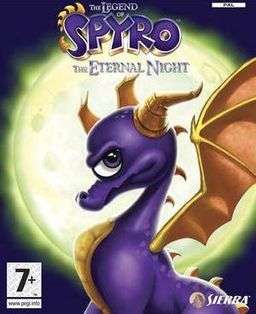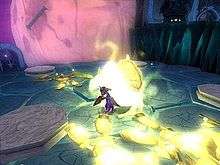The Legend of Spyro: The Eternal Night
| The Legend of Spyro: The Eternal Night | |
|---|---|
 | |
| Developer(s) |
Krome Studios Additional work by Amaze Entertainment (NDS & GBA) |
| Publisher(s) | Sierra Entertainment |
| Distributor(s) | Vivendi Games |
| Producer(s) | Mike Schneider |
| Writer(s) |
Michael Graham Patrick Hegarty Chris A. Wilson |
| Composer(s) | Spiralmouth |
| Series | The Legend of Spyro |
| Engine | Merkury Engine[1] |
| Platform(s) |
PlayStation 2 Game Boy Advance Nintendo DS Wii |
| Release date(s) |
PlayStation 2, Game Boy Advance & Nintendo DS Wii |
| Genre(s) | Action-adventure |
| Mode(s) | Single-player |
The Legend of Spyro: The Eternal Night is a video game in the Spyro the Dragon series. It is the second game in The Legend of Spyro trilogy, released for the PlayStation 2, Game Boy Advance, Nintendo DS and Wii. It was the last game officially released for the Game Boy Advance in Europe.
It utilizes voice talent by Elijah Wood, Gary Oldman (reprising their roles of Spyro and Ignitus respectively), and Billy West (as Sparx, replacing David Spade).[2] Kevin Michael Richardson (as Terrador and Gaul) and Mae Whitman (as Cynder, featuring recycled voice clips of Cree Summer from its predecessor) were also confirmed to be part of the cast during Sierra Gamers' Week 2007.[3]
Gameplay

The gameplay is similar to its predecessor. Spyro must travel to the end of a level in a linear fashion and defeat the boss at the end of each level, defeating enemies with his combat moves. However, there is a much larger emphasis on exploration and puzzle-solving.
Spyro will learn different breaths from the Chronicler, who is met in Dreams which occur to Spyro during the course of the game. The breaths are tools for defeating enemies. They come in different elements; fire, ice, electricity and earth. Spyro can also use furies, which are big blasts of elemental magic. Spyro is required to obtain a certain amount of purple gems to be able to use these skills.
Spyro is able to learn the skill of "dragon time" from the Chronicler. This skill allows Spyro to slow down time. He can use this ability to jump on platforms which are too fast to land on with his normal speed. He can also use this ability to defeat enemies easier.
Throughout the levels there are forty quills. Each quill collected gives the player 5 pieces of concept art.
Setting
The Legend of Spyro: The Eternal Night continues the storyline established by A New Beginning, which ended with the defeat of Cynder, a black dragon in servitude for an enemy called the "Dark Master". In The Eternal Night, a new antagonist — "Gaul" the Ape King — has risen to power and is intent on resurrecting the Dark Master on The Night of Eternal Darkness.
Plot
The story begins with Spyro following Cynder through the swamp surrounding the Dragon Temple. Spyro catches up with her and asks her not to leave. Cynder says she's sorry for what she had done in the previous game and wishes to find out where she belongs in the world, currently believing that she does not belong at the temple. She runs off, leaving Sparx and Spyro alone. Soon after she is gone, the Temple is attacked by the apes. After Spyro repels the attack, Ignitus, the leader of the dragons and master of fire, sends Spyro to seek out a tree that Spyro saw in a vision (in the dreams to follow, he gets his powers back, as he lost them at the end in The Legend of Spyro: A New Beginning) while Ignitus looks for help against the Apes. As Spyro searches for the tree, he also searches for another dragon known as the Chronicler, who asked Spyro in the same vision to find him. When he finds the tree (in the Game Boy Advance version, he falls into a cave), it suddenly turns into a tree monster known as Arborick (the Game Boy Advance version calls the monster Naga) and attacks Spyro. After Arborick is defeated, Spyro is captured by pirates, and is taken onboard their ship to take part in gladiatorial combat.
After Spyro defeats a third enemy in the arena, he is made to fight Cynder, whom the pirates captured as well. Before they can think of a plan to escape together, the pirate ship is suddenly attacked by the apes, who capture Cynder. After Spyro escapes the ship he discovers that the Apes have established a base on the Mountain of Malefor, also known as the Well Of Souls, in an effort to revive the Dark Master using a lunar alignment called the Night of Eternal Darkness. He also discovers that they are keeping Cynder prisoner hoping to turn her to their side.
Spyro eventually finds the Chronicler, who tells him about the Dark Master. According to him, the Dark Master was the first purple dragon; his raw power allowed him to master practically every elemental power. When his growth failed to stop, he was exiled and sealed away by the dragon elders, but not before he taught the Apes how to use dragon magic. The Chronicler wants Spyro to hide from the Dark Master until a later time, but Spyro insists on going to Cynder’s aid.
When he gets to the mountain, Gaul, the Ape King, orders Cynder to attack Spyro. When she attacks Gaul instead, he knocks her out and challenges Spyro himself. During the fight, the lunar alignment occurs, and the evil energy it generates is channeled through Spyro, which turns Spyro into Dark Spyro. He uses his immense power to turn Gaul to stone then blast his body apart, killing him, then leaps back into the beam of evil energy. Cynder awakens and knocks Spyro out of the beam, freeing him from the beam's power. When the alignment passes, the mountain begins to crumble around Spyro, Sparx, and Cynder. Remembering the Chronicler's words about riding out the storm, Spyro uses his powers to encase himself, Cynder, and Sparx in crystal to protect them as the Well of Souls collapses. After the credits, the trio are shown in the crystal while someone is watching as the Chronicler says that when Spyro awakens, the world would be different. The story continues in The Legend of Spyro: Dawn of the Dragon.
Reception
| Reception | ||||||||
|---|---|---|---|---|---|---|---|---|
| ||||||||
Home console versions of The Legend of Spyro: The Eternal Night, like its predecessor, received mixed reviews, GBA version, however, received positive reviews. Aggregating review websites GameRankings and Metacritic gave the Game Boy Advance version 81.75% and 80/100,[4][8] the Wii version 62.06% and 60/100,[5][9] the PlayStation 2 version 58.64% and 54/100[6][11] and the Nintendo DS version 56.33% and 56/100.[7][10]
References
- ↑ Bishop, Sam (November 19, 2007). "The Legend of Spyro: The Eternal Night Review". IGN.
- ↑ IGN: The Legend of Spyro: The Eternal Night Preview. Retrieved July 11, 2007.
- ↑ GameSpot: The Legend of Spyro: The Eternal Night Cutscene 1. Retrieved August 21, 2007.
- 1 2 "The Legend of Spyro: The Eternal Night for Game Boy Advance". GameRankings. Retrieved October 2, 2013.
- 1 2 "The Legend of Spyro: The Eternal Night for Wii". GameRankings. Retrieved October 2, 2013.
- 1 2 "The Legend of Spyro: The Eternal Night for PlayStation 2". GameRankings. Retrieved October 2, 2013.
- 1 2 "The Legend of Spyro: The Eternal Night for DS". GameRankings. Retrieved October 2, 2013.
- 1 2 "The Legend of Spyro: The Eternal Night for Game Boy Advance Reviews". Metacritic. Retrieved October 2, 2013.
- 1 2 "The Legend of Spyro: The Eternal Night for Wii Reviews". Metacritic. Retrieved October 2, 2013.
- 1 2 "The Legend of Spyro: The Eternal Night for DS Reviews". Metacritic. Retrieved October 2, 2013.
- 1 2 "The Legend of Spyro: The Eternal Night for PlayStation 2 Reviews". Metacritic. Retrieved October 2, 2013.
External links
| Wikiquote has quotations related to: The Legend of Spyro: The Eternal Night |